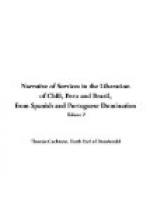Accordingly, still maintaining our disguise under American colours, the O’Higgins and Lautaro stood towards the batteries, narrowly escaping going ashore in the fog. The Viceroy having no doubt witnessed the capture of the gun-boat, had, however, provided for our reception, the garrison being at their guns, and the crews of the ships of war at their quarters. Notwithstanding the great odds, I determined to persist in an attack, as our withdrawing without firing a shot, would produce an effect upon the minds of the Spaniards the reverse of that intended; having sufficient experience in war to know that moral effect, even if the result of a degree of temerity, will not unfrequently supply the place of superior force.
The wind falling light, I did not venture on laying the flag-ship and the Lautaro alongside the Spanish frigates, as at first intended, but anchored with springs on our cables, abreast of the shipping, which was arranged in a half-moon of two lines, the rear rank being judiciously disposed so as to cover the intervals of the ships in the front line. A dead calm succeeding, we were for two hours exposed to a heavy fire from the batteries, in addition to that from the two frigates, the brigs Pezuela and Maypeu, and seven or eight gun-boats; nevertheless, the northern angle of one of the principal forts was silenced by our fire.
A breeze springing up, we weighed anchor, standing to and fro in front of the batteries, and returning their fire; when Captain Guise, who commanded the Lautaro, being severely wounded, that ship sheered off, and never again came within range. As from want of wind, or doubt of the result, neither the San Martin nor Chacabuco had ever got within fire, the flag-ship was thus left alone to continue the action; but as this, from want of co-operation on the part of the other ships, was useless, I was reluctantly compelled to relinquish the attack, and withdrew to the island of San Lorenzo, about three miles distant from the forts; the Spaniards, though nearly quadruple our numbers, exclusive of their gun-boats, not venturing to follow us.
The annexed was the Spanish naval force present: Frigates.—Esmeralda, 44 guns; Venganza, 42 guns; Sebastiana, 28 guns.
Brigs.—Maypeu, 18 guns; Pezuela, 22 guns; Potrilla, 18 guns; and one, name unknown, 18 guns.
Schooner, name unknown, one long 24, and 20 culverins.
Armed Merchantmen.—Resolution, 36 guns; Cleopatra, 28 guns; La Focha, 20 guns; Guarmey, 18 guns; Fernando, 26 guns; San Antonio, 18 guns.
Total, fourteen vessels, of which ten were ready for sea; and twenty-seven gun-boats.
In this action my little boy had a narrow escape. As the story has been told by several Chilian writers somewhat incorrectly, I will recapitulate the circumstances.
When the firing commenced, I had placed the boy in my after-cabin, locking the door upon him; but not liking the restriction, he contrived to get through the quarter gallery window, and joined me on deck, refusing to go down again. As I could not attend to him, he was permitted to remain, and, in a miniature midshipman’s uniform, which the seamen had made for him, was busying himself in handing powder to the gunners.




